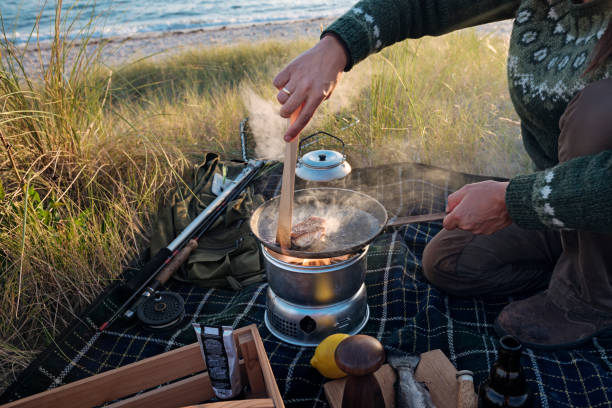Propane, butane and LPG are the most popular camp stove fuels. We’ll also include electricity for comparison purposes. Other camp stove fuel types, such as gasoline, alcohol, paraffin, kerosene and gasoline, aren’t often used.
What is the difference in each fuel type? Which one is better for camping in a van, motorhome or tent?
This article will compare the pros and cons of each camp stove fuel type to help you decide which one is right for you. Our shortlist of top camp stove fuel types is:
- Propane
- – Best for winter usage.
- Butane
- It- Ideal for portability.
- LPG
- – Best for availability.
- Electricity
- It- Ideal for cooking indoors.
Types of camp stove fuel: which one is best for you?
Propane
Propane These small, lightweight canisters are attached to the camp stove’s side using an adapter. The adapter is included in most propane camping stoves.
Propane is an efficient camp stove fuel. It produces a lot of heat and can cook food quickly. Propane also has a high degree of flame control, making it easy to bring the flame down to a simmer or boil.
Propane works at temperatures as low as -42, which is its best part. Propane is more suitable for winter camping than butane (which has a higher boiling temperature of -2).
- Pros:
- Camp stove fuel that is very cold-tolerant.
- High efficiency, lightweight and easy to heat.
- Excellent flame control.
- Canisters that are lightweight and easy to transport.
- Uninterruptible shelf life, as long as the canister remains intact.
- Cons:
- It is slightly more expensive than LPG and butane.
- LPG is less readily available than LPG.
- Only be used outdoors or in a campervan that is well ventilated.
- You will likely need to buy an additional canister if you run out.
Butane
Butane is similar to propane in the small, lightweight canisters that are screwed into camp stove sides using an adapter.
Butane is more efficient than propane, putting out approximately 12% more energy for the same amount of gas. You can also easily reach a simmer or boil with it.
Butane is not as effective as propane when it comes to sub-freezing temperatures. Butane will stop working around -2, while propane will work well down to -42. Butane should be reserved for summer camping trips.
- Pros:
- Best camp fuel type for summer usage.
- It is more efficient than LPG and propane.
- It is slightly more affordable than propane.
- Excellent flame control.
- Canisters that are lightweight and easy to transport.
- Uninterruptible shelf life, as long as the canister remains intact.
- Cons:
- Not as warm-tolerant as propane and is not ideal for winter camping.
- LPG is less readily available than LPG.
- Only be used outdoors or in a well-ventilated campervan.
- You will likely need to buy an additional canister if you run out.
- LPG
LPG LPG (liquid petroleum gas) is the most popular camp stove fuel. It is a combination of propane and butane. LPG can be used in most camping stoves made overseas.
LPG is a mixture of propane and butane. It is extremely efficient and offers a good level of flame control. It has a low boiling point, meaning it can be used at temperatures as low as -42F.
- Pros:
- Excellent fuel for summer and winter.
- It is just as efficient as propane or butane.
- Both propane and butane are more affordable.
- Both propane and butane are more readily available.
- Refillable and swissable
- Excellent flame control.
- Shelf life is indefinite (so long as the gas bottles are ok).
- Cons:
- It is lighter, more portable and larger than propane and butane.
- Only be used outdoors or in a campervan that is well ventilated.
Electricity
Induction camp stoves that use electricity to heat plates are called electric induction camp stoves. You can either plug your campervan into the mains power or use a powerful solar system with an inverter and a battery.
The most efficient way of powering a camp stove is with electricity. It also gives you the best control over the heat. Induction stoves are safe to use inside and outside your campervan. This makes them ideal for summer camping and winter camping.
- Pros:
- It can be used both in summer and winter.
- This is often the most economical option if you are a van hirer and don’t need to set up the electricals. ).
- Campervan kitchen stays cooler.
- You can use the campervan without ventilation.
- This is the most efficient.
- Temperature control is the most accurate.
- Cons:
- You will need to be able to camp at power sites or have a solar/battery setup.
- This is more costly to set up for a campervan owner than a gas stove camp stove.




